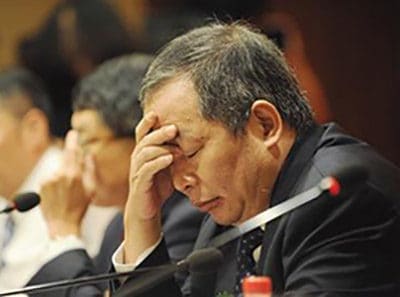
Greentown co-chair Song Weiping may have recurring financial headaches
Greentown China, which nearly became a casualty of the mainland’s previous housing slowdown in 2014, has raised concern among investors this week after the Hangzhou-based developer issued a notice urging staff to urgently improve the company’s cashflow.
The notice distributed to Greentown team members from executive general manager Ying Guoyong, and obtained by mainland news site Jiemian.com, presented a three point plan to improve the company’s finances, including “making every effort to speed up sales,” “comprehensively accelerating collection of funds” and “controlling payment outflows.”
While Greentown representatives have pushed back at growing controversy over the company’s cashflow issues, the memo’s appearance amidst tightening credit conditions and a slowing property market is bringing back recollections of the developer’s 2014 crisis.
Hangzhou Developer Focuses on Overcoming Policy-Induced Hurdles
A theme running through Ying’s memo to his staff was overcoming financial challenges presented by government restrictions on housing sales, including caps on sale prices and limits on pre-sale periods.
The company document ordered Greentown staff to focus sales efforts on projects not limited by government home purchase restrictions and to create special offers and incentives for projects that have more than two months of inventory on hand.
Once sales contracts are signed, the memo exhorted team members to “safeguard the timely collection of mortgage payments.” On the debit side of the ledger the company now requires applications at least 15 days in advance and group level approval before making prepayment on contracts.
Moody’s Warns on Developer Liquidity

Greentown is best known for its high-end villas, such as this Hainan project
While Greentown contends that its memo is simply sound fiscal management, the current climate already is raising concerns over the financial health of China’s home builders.
“Chinese developers continue to face tight liquidity amid strict onshore credit conditions,” Celine Yang, an assistant vice president and analyst with Moody’s Investors Service said in a note last week, adding “but we expect most of our rated developers will be able to refinance their upcoming bond maturities.”
The bond rating agency points out that around $45 billion worth of onshore bonds and $17.1 billion of offshore bonds will mature or become puttable in the next 12 months for mainland Chinese developers which it covers.
Mainland regulators concerns over developer debt have presented further headaches for builders after the National Development and Reform Commission last week said that it would ban new developer bond issues, except for refinancing maturing debt, or in cases where new credit was necessary to avoid a default.
Greentown Pushes Back at Tales of Financial Woe
In response to the report, Greentown has responded in the local press that its finances remain solid. According an account in thepaper.cn, the developer says it has cash and other current assets on hand of RMB 50 billion ($7.5 billion), which are said to exceed its interest-bearing liabilities due within the next year.
In May 2014 Greentown Chairman Song Weiping and some of his close associates agreed to sell up to 30 percent of their 43 percent stake in the developer to Sun Hongbin’s Sunac China, in a deal that would have been worth close to HK$7 billion.
With the housing market improving later that year, however, Greentown pulled out of the deal after Sunac had already begun putting its own management team in place.
For his part, Song blamed Greentown’s troubles on “stupid” government policy makers. In May 2016, state-owned China Communications Construction Group (CCCG) paid approximately $148 million boost its stake in Greentown to 28.9 percent, making it the single largest shareholder in the company. Song Weiping remains a co-chair of the developer.
Leave a Reply